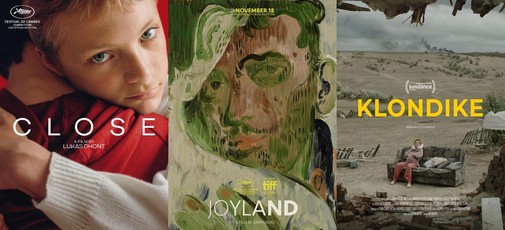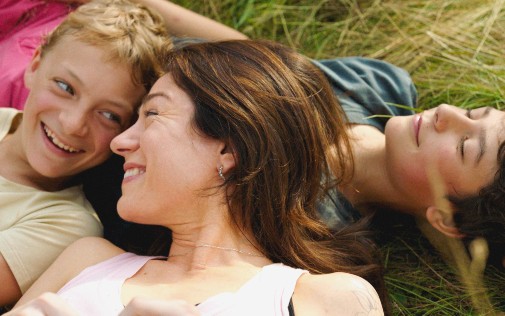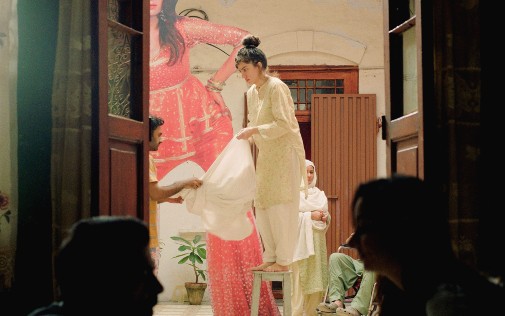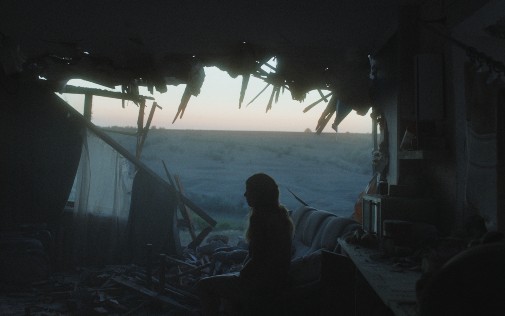Best International Film Reviews: Belgium, Pakistan, and Ukraine
 Tuesday, November 29, 2022 at 8:37AM
Tuesday, November 29, 2022 at 8:37AM 
The most wonderful time of the year is upon us. No, not the holiday season. No, not even the awards season as a whole. It's time to delve deep into the submissions for Best International Film before the Academy's committees whittle down the 92 titles to a measly 15-wide shortlist from which the entire voting body will choose its five nominees. The list will be made public on December 21st, so until then, we shall explore the race's offerings, from its major contenders to more obscure selections. To start things off, let's look into three titles that feel bound to make the shortlist, both for reasons of quality, reputation, and international controversy…
CLOSE (Belgium)
 © A24
© A24
After the overrated misfire of Girl – another Cannes winner that became Belgium's Oscar submission – I didn't have high hopes for Lukas Dhont's sophomore feature. Though Close failed to impress me quite as much as it did other critics and festival jurors, the film's a significant step up. And yet, many issues remain, including how the pain of LGBTQ+ youth is made into a picture-defining cataclysm, obfuscating all else, verging on exploitation. Those who yearn for stories about queer joy better look elsewhere, for this emerging auteur looks to have no interest in the topic.
In Close, the story revolves around the intense friendship between Léo and Rémi, two thirteen-year-old boys who start to drift apart when, at school, their bond attracts unwanted attention. Expectations of heteronormative masculinity weigh heavily on the relationship, with Léo seeking distance in a moment of crisis. To reveal any more would be a detriment to a film whose impact relies on visceral shocks, confusion in the face of overwhelming emotion. Indeed, as if to underline that quality, Dhont opts for a style smelling of microwaved-Dardennes.
The director closes on his characters until we're trapped inside their insular experience. Only we never really experience their world, so fixated is the director on capturing every micro-expression in his cast's faces. The strategy may result in shattering scenes, but it just as often robs the film of visual storytelling beyond the documentation of acting. A bedroom's fate, for example, would hit much harder if, as the audience, one was more keenly aware of the space, its particularities, and possibilities beyond existing as the fuzzy background for countless close-ups.
Thankfully, the actors are up to the challenge of carrying Close on their backs, with Gustav De Awele and Émilie Dequenne (Rosetta herself!) fighting for the MVP title. Nevertheless, as awe-inspiring as they are, the picture's adolescent lead, Eden Dambrine, deserves special applause. Anchoring this sentimental storm mustn't have been easy, but the little thespian meets the Herculean task head-on and effectively squeezes tears out of all spectators, no matter how stoic they might say they are – seriously, I rarely heard as much sniffling in a movie theater. Be prepared to weep! B-
RELATED READING: Elisa’s Cannes Diary – Children Are the Future?
JOYLAND (Pakistan)
 © WME Independent
© WME Independent
A lot has been written about Joyland after it was banned in its home country. The decision has since been reverted thanks, in no small part, to international outcry. So much so that, in the span of a few days, it went from a beloved but obscure festival darling to one of the most discussed Oscar submissions of the season. That level of attention is bound to pay off come voting time, making it a likely candidate for becoming Pakistan's first shortlisted submission, maybe its first nominee. It wouldn't be an undeserved honor since this is one of the year's best pictures, regardless of nationality or language.
Saim Sadiq's feature debut concerns the fates of the Rana family, a traditional household within a strongly patriarchal society. Though every member gets their moment to shine, Joyland centers on the clan's youngest son, Haider, and his wife, Mumtaz. Seeking his father's approval, he procures a job, effectively condemning his spouse to a life of housework, cutting off her aspirations of independence. The work he gets, however, is far from the sort of thing that would satisfy the patriarch. Haider becomes the most rhythmless background dancer you ever did see, falling for the star of the show in the process. She's Biba, a charismatic trans woman with big dreams.
Through a narrative tapestry much vaster than one might expect at first glance, Joyland affirms itself as a rhapsody of empathy. It's also a lament about how conservative systems problematize desire, making it a destructive force rather than the miracle it feels like when you're the one set aflame from within. Repression is thus a time bomb, and someday it will explode, no matter who tries to deny the truth by appealing to archaic rules. The movie camera sees it all, allowing itself to explore both the beauty of passion and the forces of oppression, while a multifaceted screenplay allows each character to come into their own, an expression of pure humanism in the form of cinema.
Here, first kisses are like galaxies being born and the waves are the embrace of oblivion. The only thing more breathtaking than Joe Saade's lensing might be the cast's collective efforts, imbuing every person that appears on-screen with bottomless depths. You'll lose yourself in these people. Oh, how you'll learn to love these characters, flaws and all. And oh, how you'll suffer for it. But there's ecstasy mixed in with the agony, a sweet ache that smells like catharsis and tastes of cinematic perfection. A-
RELATED READING: Nathaniel on the news of the film’s ban.
KLONDIKE (Ukraine)
 © ArtHood Entertainment
© ArtHood Entertainment
Maryna Er Gorbach's latest film won prizes at Sundance and Berlin before the war in Ukraine escalated into a full-on invasion by Russian forces. After the events of February 24th and everything that has happened since, Klondike only gains in importance, its significance elevated by an ongoing tragedy that shows no signs of ceasing. After all, the film's entire point is to represent the bleakness of life during wartime, even before the rest of the world was ready to recognize the magnitude of what was happening. Not that Gorbach's focus is on the matters of state or power negotiations on a global scale.
Instead, Klondike crystalizes the experience of a nation through domestic synecdoche, a tale that rings with ominous symbolism. The narrative portrays the life of a Ukrainian couple living near the Russian border in the summer of 2014 when cross-border shelling tore houses asunder while catastrophic crashes made the landscape hell on earth. This was a precipitous time, after the Crimean annexation and right at the time when the Russian troops became more aggressive, prompting Ukraine to decry the move as a direct invasion.
For the protagonists, such grand happenings matter less than the visceral reality of trying to live in a broken world. Unrelenting to the point of feeling like punishment perpetrated by the cineastes upon their audience, Klondike is an experience marked by intense feelings of outrage, anger bubbling on-screen and out. Formalistic rigor is commendable, but even the methodical pace overflows with too many redoubled ideas after a while. It all starts to feel redundant like a short stretched beyond its ideal shape.
As the dust settles on an unforgettable last shot, the future lost, one feels defeated beyond belief, and while that's the point, the numbness it inspires isn't – or, if it is, should it be? Repetition married to darkness unbound produces apathy, like poison for the film organism. Sure, there's no way of arguing against Klondike's value as an expression of our times, against its urgency and importance, the fury coursing through its veins. However, as a piece of narrative cinema, its quality is less certain. B-
Oscar Odds? As the introductory paragraph suggests, these three films feel bound for the finalist list. It'd be a great surprise if any of them failed to make the cut, though Klondike might be in the most precarious position. In contrast, Close is the safest bet, both because AMPAS loves Belgian cinema and because it's a sentimental favorite bound to move voters. Similarly, it's one of the biggest threats to make it to the nominations. The Academy loves a good cry.



Reader Comments (1)
"KLONDIKE (Ukraine)" Maybe people will watch we become what we behold a lot. The war has attracted the attention of many countries.